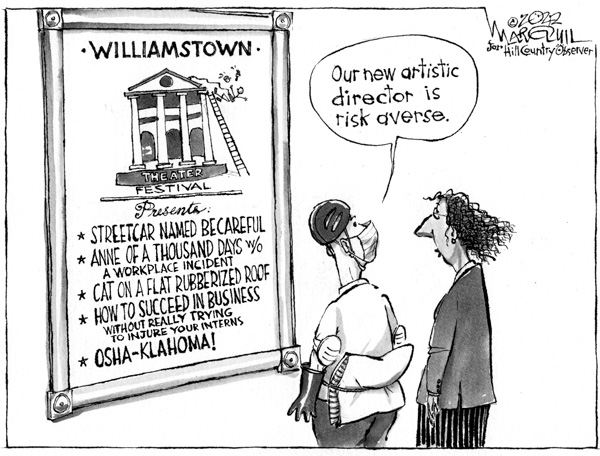Editorial August 2022
E D I T O R I A L
For love of theater, festival must change
To outsiders, the heady creative atmosphere of a summer theater festival might seem an unlikely place to be worried about workplace safety.
But theater productions depend on people who wrestle with heavy equipment, hot stage lights and electrical connections -- and who work with power tools to build sets. Physical exhaustion can contribute to dangerous accidents.
So it was significant when the Williamstown Theatre Festival pledged earlier this year that its workers would be guaranteed at least one day off each week.
As our cover story this month details, the Williamstown festival is in the midst of a season of big changes. It has cut back the number of major shows it is producing this summer from seven to three, and it is figuring out how to stage them without its own scene shop – and without the small army of unpaid interns and apprentices who powered its productions in years past.
Early last year, a group of festival alumni wrote to its board and leadership calling for change. In their open letter, the alumni detailed their own experiences and described a system in which the festival increasingly relied upon young, mostly unpaid laborers who were subjected to abusive and dangerous working conditions while logging up to 100 hours a week with no days off.
The alumni also described a toxic workplace culture that grew up around the interns’ free labor – one that tolerated incidents of sexual harassment and racial bias while providing no meaningful process for addressing these incidents.
Although some of the festival’s leaders had been aware of these concerns for some time and had taken small steps toward reform, the move toward more sweeping changes appears to have taken off last fall after the Los Angeles Times published a lengthy story about the festival’s broken culture, based on interviews with 25 current and former employees and interns. The next month, Artistic Director Mandy Greenfield resigned, and by February the festival was announcing its scaled-back plans for this summer.
By all accounts, the festival has relied upon the help of unpaid interns and low-paid staff to turn out ambitious productions – and lots of them in quick succession – throughout its 67-year history. And for decades, an internship at Williamstown meant the chance for young people just starting their theater careers to make professional connections while working alongside some of the top talent in the field. Long hours were just part of the immersive experience.
At some point in recent years, however, a system that once inspired labors of love began to seem more like exploitation. Interns and apprentices, who had to pay tuition to participate in the festival – and housing and food costs on top of that – told of being required to work so long and hard that they skipped classes and had little chance for meaningful interaction with their supposed mentors.
To their credit, the festival’s leaders now appear to be working sincerely to change things. They have disbanded its former internship program, and this year, the festival joined forces with Williams College to create a new intensive training program that provides 20 students with hands-on theater experience as well as academic courses.
The focus of the new program is on creating experiences that are primarily for the benefit of the students. As a step toward changing the festival’s culture, that seems like a good place to start.


